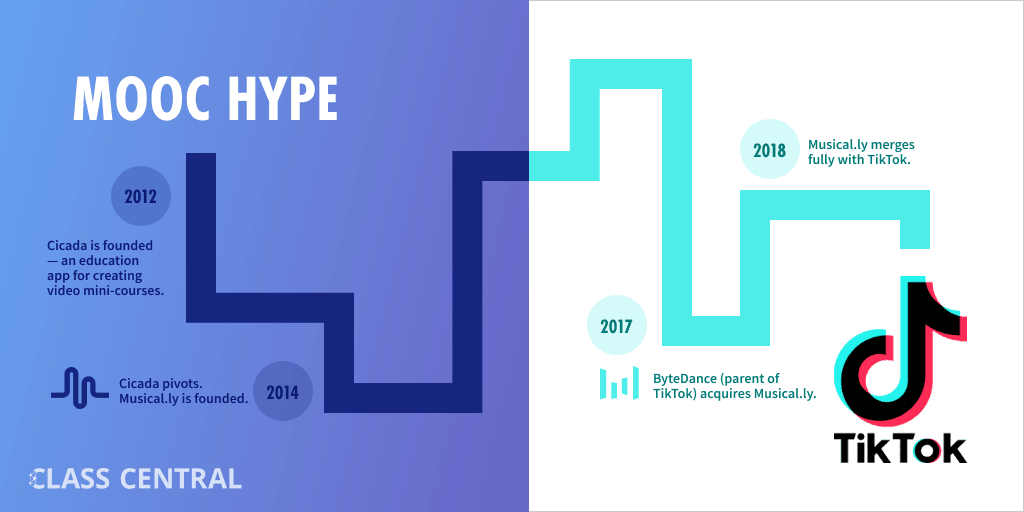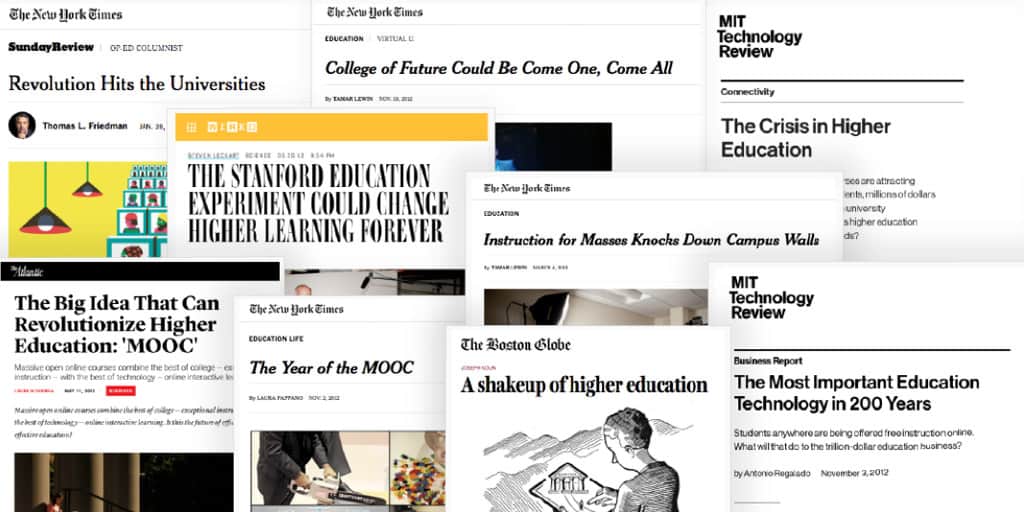From MOOCs to TikTok: The Unexpected Impact of the MOOC Hype
Even though the MOOC hype might have fallen short of expectations, it did serve as a catalyst for change.

One of my favorite podcasts is Acquired, which takes deep dives into the history of companies that go public or get acquired. It’s something I’ve tried to replicate in my article about Coursera’s monetization journey — capturing the history and talking about experiments (whether successful or not) the company undertook along the way.
While listening to their episode on TikTok (one of the world’s fastest growing apps), I learned that the founders of Musical.ly (later merged into TikTok) started out as a MOOC competitor.
From Education to Musical.ly
Here is how the story goes, according to Acquired.
Alex Zhu, one of the founders of Musical.ly, worked for a few months as a “futurist” at SAP, focusing specifically on the future of education. He assumed that role in June 2012, right when MOOCs started making headlines.
Soon after, MOOCs also started making headlines for their low completion rate. Zhu saw an opportunity to improve on this by using shorter videos (3 – 5 minutes), crowdsourced from experts from a variety of professional domains.
To this end, Zhu raised $250,000 and launched Cicada, an app for creating mini-courses. The app failed. One of the challenges they realized was that condensing the information into three-minute videos took a lot of effort.
With this insight in mind, the team behind Cicada launched Musical.ly, an app that allowed for even shorter videos (15 seconds). Eventually, Musical.ly was acquired and merged into TikTok, which then leveraged Musical.ly’s audience to break into the US market. I recommend listening to the whole podcast if you want to learn the whole journey.
The story seemed familiar to me and brought to mind two observations I’ve made over the years.
MOOC Completion Rates
The first observation is that, despite numerous complaints about MOOC completion rates, I have yet to see someone offer a better alternative.
Usually, high completion rates means two things:
- Lighter material and/or shorter courses.
- Paywalls — that is, reaching a significantly smaller number of self-selected learners compared to a free course.
Put differently, you have to surrender either depth or accessibility in order to increase completion.
The Impact of MOOC Hype

The second observation is that the MOOC Hype generated a lot of energy and FOMO (Fear of Missing Out) that set a number of elements into motion. Back in 2012, there were articles every month heralding the end of universities and/or announcing funding rounds and university partnerships. The hype culminated with the New York Times declaring 2012 the Year of the MOOC.
I don’t know if MOOCs changed the world, but the hype itself had an impact.
I was one beneficiary from this hype when I started Class Central back in 2011 to keep track of MOOCs (or rather, of Stanford’s free online courses, as they were known back then), eventually landing a small investment in late 2013.
This is a sentiment I’ve heard echoed many times over the years: even though the MOOC hype might have fallen short of expectations, it did serve as a catalyst for change. And without it, the online learning landscape of 2020 would be very different — probably much smaller.
Consider for instance:
Universities teaching online: Since 2012, close to a thousand universities in the world have created at least one MOOC. These courses have been taken by 110 million learners around the world.
Governments taking notice: National MOOC platforms have been launched in countries such as in India, Thailand, France, and Mexico. And it seems that MOOCs are as big in China as in the rest of the world combined.
Large-scale degree programs: Georgia Tech’s MOOC-based Online Master in Computer Science (OMSCS) has close to 10,000 students and accounts for 7% of MS-CS graduates each year in the US. And the University of Illinois Urbana-Champaign is shutting down its on-campus MBA in favour of its iMBA on Coursera.
On-campus impact: According to MIT, 99% of their undergrads have taken a course online through the Residential MITx platform, which is based on Open edX.
EdTech and industry growth: Finally, the hype led to creation of a number of EdTech startups from 2012 to 2014 — some inspired by MOOCs; others, like Cicada, trying to address MOOC deficiencies. A few of Class Central’s competitors (the ones who survived) pivoted into building their own courses or into corporate training.
To learn more about the impact of MOOCs (or lack thereof), take a look at Class Central’s MOOCReport where we track the evolution of the online education industry.







Gajendra
Hey Dhawal, I would like to know what according to you is the future of Education? Will more MOOCs come up or will there be new innovative ways of teaching and engaging students?
Shoaib
Not Dhawal. I don’t know what the future of education is going to be. What I think it should be is free and online.
Muvaffak GOZAYDIN
ONLY from best schools and at a small charge such as $ 50-100 per course . That is the real cost . Nothing can be free forever.
Muvaffak GOZAYDIN
No . But
I asked 20 top universities to set up a online universities consortium .
Provide 10.000 online courses for degrees same as f2f classes .
Charge only $ 100 per course .
Then provide a first class degrees from first class universities .
I did it with MOOC courses 13.500 of them Thanks to Shah .
http://www.worlduniversity.london
I even provide 5 master degrees with MOOC courses .
even I selected only best of best courses for degrees . Cost to me is $50 .
Onyemobi Desta Anyiwo
I personally feel that MOOCs can have an even bigger impact on high school than colleges and universities, especially in regards to Advanced Placement courses.
Carolyn Fox
Couldn’t agree with you more. I wrote about this for opensource.com years ago, but am going to try my part to implement MOOCs for AP courses in a public high school asap. Some high schools are receptive to using MOOCs for APs and OERs, but others are very resistant to embracing MOOCs or OERs.
Carolyn Fox
Also – I should add that there are many homeschoolers in the US and around the world who have heavily depended on MOOCs for their children to learn, including mine! IF you have a student who is working x years ahead of the standard school curriculum, they are a lifesaver and a gamechanger.
Muvaffak GOZAYDIN
MOOCS are from first class universities . Therefore they are valuable .
OERs are not .
Don
I can tell you that for me MOOCs have been amazing. Since 2012 or 13 I’ve completed close to 50 courses. I’m presently on course 4 of 5 in the Google IT specialization. I started the program in December.
Mphoentle
MOOCs are also taking shape in Africa, with Nigeria and South Africa being among the top consumers of MOOCs, although there is an ongoing conversation that Africa must design their own MOOCs – Africanisation of Education, which I fully support.
Muvaffak GOZAYDIN
Come on . You do nmot need local MOOCs .
Here the value is in the C O N T E N T .
Content is from Harvard, Stanford . You cannot dream up to see those courses even in your dream . Just promote MOOCs from best schools as much as possible .
John Sanders
Education is not only for the young. I am retired , and I need to understand an ever increasing numbers of topics because I spent 40 + years working and had no time to attend a college. I have a couple of degrees (geology and maths) but they are too narrow… need more. MOOCs will become and ever increasing resource for the very large numbers of retired. We may not be interested in acquiring certificates , but that makes them free – if asked- I do value them enough to make a contribution. So there you are : a different but valid model for MOOCs which adds up to a University for the third age – try targeting that group.
(My last two courses, run by HarvardX, were on Neuroscience – they are brilliant!)
Muvaffak GOZAYDIN
We all must defend and support Dhawal Shah for his contributions to education of the world . I applaud it very much .